高级英语复习笔记2
- 格式:doc
- 大小:44.00 KB
- 文档页数:5
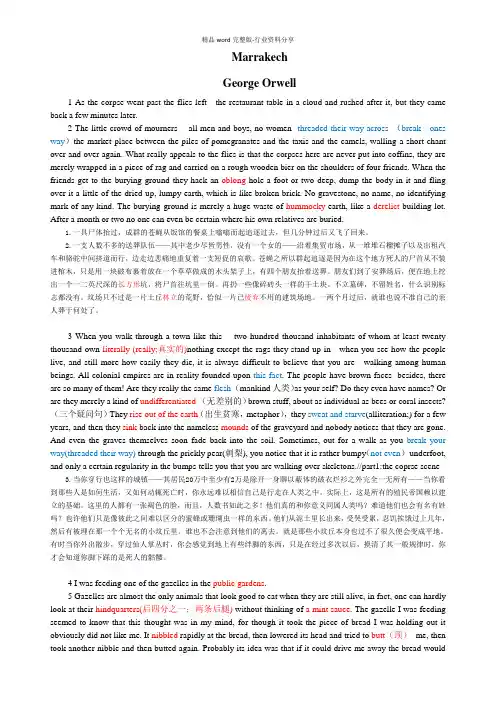
MarrakechGeorge Orwell1 As the corpse went past the flies left the restaurant table in a cloud and rushed after it, but they came back a few minutes later.2 The little crowd of mourners -- all men and boys, no women--threaded their way across(break ones way)the market place between the piles of pomegranates and the taxis and the camels, walling a short chant over and over again. What really appeals to the flies is that the corpses here are never put into coffins, they are merely wrapped in a piece of rag and carried on a rough wooden bier on the shoulders of four friends. When the friends get to the burying-ground they hack an oblong hole a foot or two deep, dump the body in it and fling over it a little of the dried-up, lumpy earth, which is like broken brick. No gravestone, no name, no identifying mark of any kind. The burying-ground is merely a huge waste of hummocky earth, like a derelict building-lot. After a month or two no one can even be certain where his own relatives are buried.1.一具尸体抬过,成群的苍蝇从饭馆的餐桌上嗡嗡而起追逐过去,但几分钟过后又飞了回来。
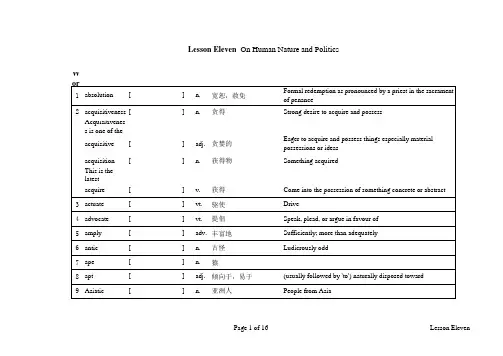
Lesson Eleven On Human Nature and Politics Words and ExpressionsText Explanation1…even in Paradise.even when he is dead.2Human beings, for the most part, are not like this."for the most part" means mostly, most of them.3on that accountbecause of that, on that reason 为了那个缘故The game was cancelled on account of the rain.4…satiety is a dream which will always elude you.…to think that man can become satisfied is an illustion.5…motives that survive the conquest of hunger.…motives that continue to exist when hunger is satisfied.6One of the troubles about vanity is that it grows with what it feeds on.One problem of vanity is that one grows more vain if one is encouraged in one's vanity.虚荣心的问题之一是,越是有鼓励它的东西,虚荣心就越强。
feed on: give food to 给予食物,喂What do you feed your cat on?7the condemned murderera murderer who has been found guilty and sentenced to punishment, possibly the death sentence.8Politicians and literary men are in the same case.政治家和文人也属于此列。
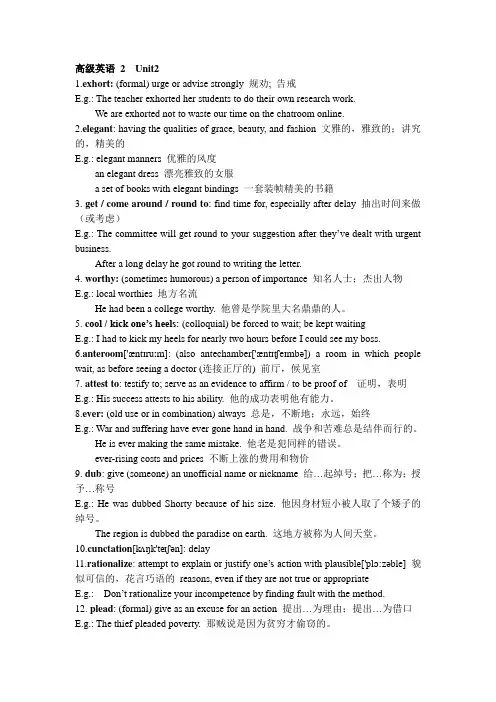
高级英语 2 Unit21.exhort: (formal) urge or advise strongly 规劝; 告戒E.g.: The teacher exhorted her students to do their own research work.We are exhorted not to waste our time on the chatroom online.2.elegant: having the qualities of grace, beauty, and fashion 文雅的,雅致的;讲究的,精美的E.g.: elegant manners 优雅的风度an elegant dress 漂亮雅致的女服a set of books with elegant bindings 一套装帧精美的书籍3. get / come around / round to: find time for, especially after delay 抽出时间来做(或考虑)E.g.: The committee will get round to your suggestion after they‟ve dealt with urgent business.After a long delay he got round to writing the letter.4. worthy: (sometimes humorous) a person of importance 知名人士;杰出人物E.g.: local worthies 地方名流He had been a college worthy. 他曾是学院里大名鼎鼎的人。
5. c ool / kick one’s heels: (colloquial) be forced to wait; be kept waitingE.g.: I had to kick my heels for nearly two hours before I could see my boss.6.anteroom['æntɪruːm]: (also antechamber['æntɪtʃeɪmbə]) a room in which people wait, as before seeing a doctor (连接正厅的) 前厅,候见室7. attest to: testify to; serve as an evidence to affirm / to be proof of 证明,表明E.g.: His success attests to his ability. 他的成功表明他有能力。
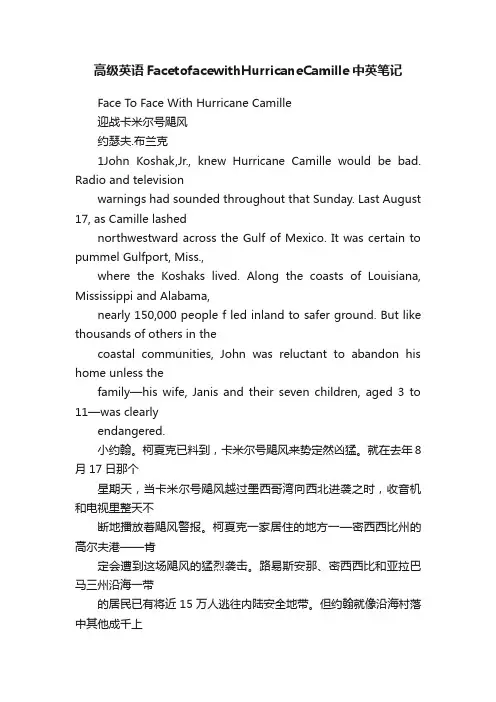
高级英语FacetofacewithHurricaneCamille中英笔记Face To Face With Hurricane Camille迎战卡米尔号飓风约瑟夫.布兰克1John Koshak,Jr., knew Hurricane Camille would be bad. Radio and televisionwarnings had sounded throughout that Sunday. Last August 17, as Camille lashednorthwestward across the Gulf of Mexico. It was certain to pummel Gulfport, Miss.,where the Koshaks lived. Along the coasts of Louisiana, Mississippi and Alabama,nearly 150,000 people f led inland to safer ground. But like thousands of others in thecoastal communities, John was reluctant to abandon his home unless thefamily—his wife, Janis and their seven children, aged 3 to 11—was clearlyendangered.小约翰。
柯夏克已料到,卡米尔号飓风来势定然凶猛。
就在去年8月17日那个星期天,当卡米尔号飓风越过墨西哥湾向西北进袭之时,收音机和电视里整天不断地播放着飓风警报。
柯夏克一家居住的地方一—密西西比州的高尔夫港——肯定会遭到这场飓风的猛烈袭击。
路易斯安那、密西西比和亚拉巴马三州沿海一带的居民已有将近15万人逃往内陆安全地带。
但约翰就像沿海村落中其他成千上万的人一样,不愿舍弃家园,要他下决心弃家外逃,除非等到他的一家人一—妻子詹妮丝以及他们那七个年龄从三岁到十一岁的孩子一一眼看着就要灾祸临头。
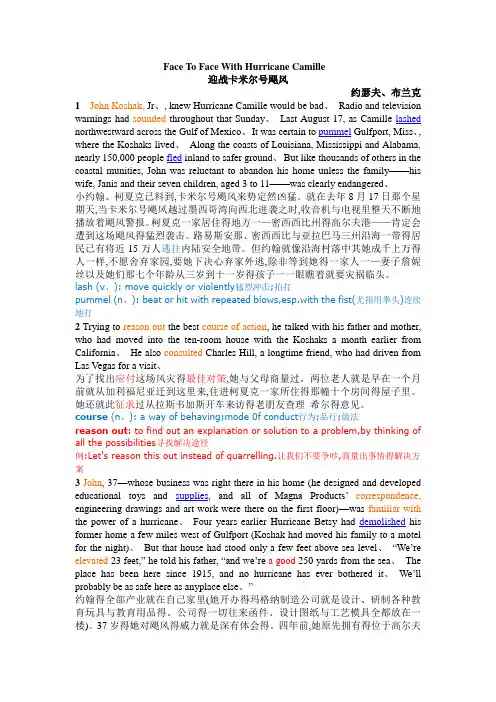
Face To Face With Hurricane Camille迎战卡米尔号飓风约瑟夫、布兰克1John Koshak, Jr、, knew Hurricane Camille would be bad、Radio and television warnings had sounded throughout that Sunday、Last August 17, as Camille lashed northwestward across the Gulf of Mexico、It was certain to pummel Gulfport, Miss、, where the Koshaks lived、Along the coasts of Louisiana, Mississippi and Alabama, nearly 150,000 people fled inland to safer ground、But like thousands of others in the coastal munities, John was reluctant to abandon his home unless the family—his wife, Janis and their seven children, aged 3 to 11—was clearly endangered、小约翰。
柯夏克已料到,卡米尔号飓风来势定然凶猛。
就在去年8月17日那个星期天,当卡米尔号飓风越过墨西哥湾向西北进袭之时,收音机与电视里整天不断地播放着飓风警报。
柯夏克一家居住得地方一—密西西比州得高尔夫港——肯定会遭到这场飓风得猛烈袭击。
路易斯安那、密西西比与亚拉巴马三州沿海一带得居民已有将近15万人逃往内陆安全地带。
但约翰就像沿海村落中其她成千上万得人一样,不愿舍弃家园,要她下决心弃家外逃,除非等到她得一家人一—妻子詹妮丝以及她们那七个年龄从三岁到十一岁得孩子一一眼瞧着就要灾祸临头。
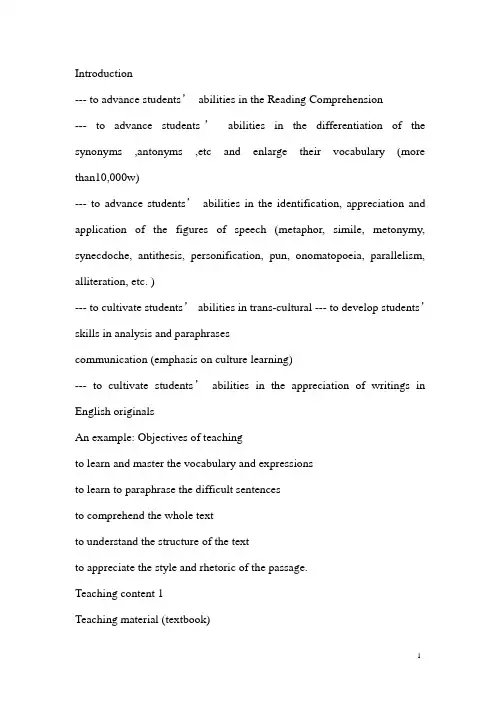
Introduction--- to advance students’abilities in the Reading Comprehension--- to advance students’abilities in the differentiation of the synonyms ,antonyms ,etc and enlarge their vocabulary (more than10,000w)--- to advance students’abilities in the identification, appreciation and application of the figures of speech (metaphor, simile, metonymy, synecdoche, antithesis, personification, pun, onomatopoeia, parallelism, alliteration, etc. )--- to cultivate students’abilities in trans-cultural --- to develop students’skills in analysis and paraphrasescommunication (emphasis on culture learning)--- to cultivate students’abilities in the appreciation of writings in English originalsAn example: Objectives of teachingto learn and master the vocabulary and expressionsto learn to paraphrase the difficult sentencesto comprehend the whole textto understand the structure of the textto appreciate the style and rhetoric of the passage.Teaching content 1Teaching material (textbook)“Advanced English” Boo k 1---Zhang Hanxi (张汉熙主编)---Foreign Language Teaching and Research Press (外语教学与研究出版社)How to Write a Book ReportThe front cover includesTitle(书名/文章题目): _____________Author(作者):_______________Class and grade:_______________No. of pages or no. of words(页数或字数):______________Name the main character(主人公):___Date: M/D/YHow to Write a Book Report p1. Brief introduction to the author and the book;2. The peculiarity of the book in the expressing or developing the content;3. The most impressive part ;4. The message delivered by the author;5. Your favorite part;6. Your comment or opinion on the book;7. What you have got after reading the book;8. The citations.Unit One The Middle Eastern BazaarLead-inTextual Structure of the TextDetailed Study of the TextRhetorical DevicesThe Middle EastGenerally referring to the area from Afghanistan to Egypt, including the Arabian Peninsula, Cyprus, and Asiatic Turkey.The Middle East is a loosely defined geographic region; the countries listed are generally considered part of the Middle East. These Middle East countries are part of the Asian continent, with the exception of Egypt, which is part of Africa, and the northwestern part of Turkey, which is part of the European landmass.Rich in oil, linking point of three continents. Nearby five seas: Black Sea, Mediterranean Sea, Red Sea, Arabian Sea, Caspian Sea (里海)BazaarBazaar: A market consisting of a street lined with shops and stalls, especially one in the Middle East.---handicraft economy, contrast to the modern societyThree famous bazaars in the Middle East:The Khan Khalili Bazaar in Cairo, Egypt埃及开罗汗·哈利利集市The Grand Bazaar in Istanbul, Turkey土耳其伊斯坦布尔大市集The Damascus Bazaar in Syria叙利亚大马士革集市China’s most busiest markets:Xiushui Street and Da Zha Lan in Beijing北京大栅栏和秀水街References“The history of Middle East”(Mesopotamia Civilization, Civilization of Ancient Egypt, Middle East Wars)“The Bible—Old Testament”(the first half of the Christian Bible)“Talmud”塔尔穆德(犹太法典)(the basis of religious authority in Orthodox Judaism)犹太法典中的几句箴言有四种人,一种人说:“我的是我的,你的是你的。
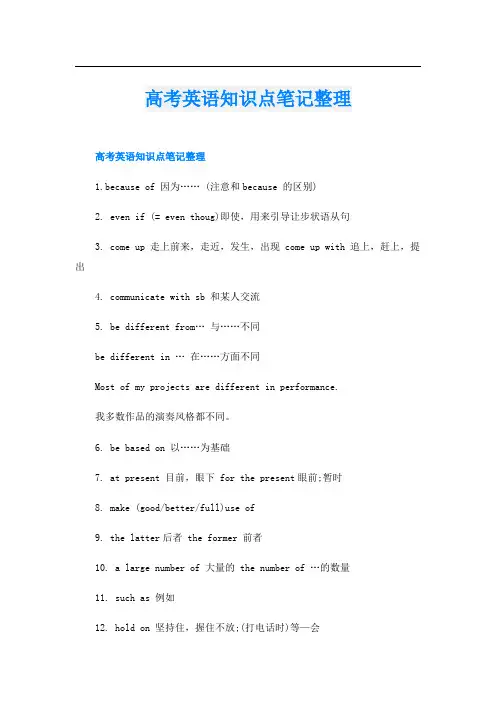
高考英语知识点笔记整理高考英语知识点笔记整理1.because of 因为…… (注意和because 的区别)2. even if (= even thoug)即使,用来引导让步状语从句3. come up 走上前来,走近,发生,出现 come up with 追上,赶上,提出4. communicate with sb 和某人交流5. be different from…与……不同be different in …在……方面不同Most of my projects are different in performance.我多数作品的演奏风格都不同。
6. be based on 以……为基础7. at present 目前,眼下 for the present眼前;暂时8. make (good/better/full)use of9. the latter后者 the former 前者10. a large number of 大量的 the number of …的数量11. such as 例如12. hold on 坚持住,握住不放;(打电话时)等—会13. … you will hear the difference in the way(that/ in which) people speak.你会听出人们在说话时的差异。
14. play a role/ part (in) 在…中担任角色;在…中起作用;扮演一个角色15. the same …as…与……一样16. at the top of…在…顶上at the bottom of 在……底部17. bring up 教养,养育;提出18. request sb (not) to do sth. 要求某人做/不要做某事19. be satisfied with…对……感到满意,满足于20. suggest v. (request,insist…)I suggested you do what he says. 我建议你按照他说的去做。
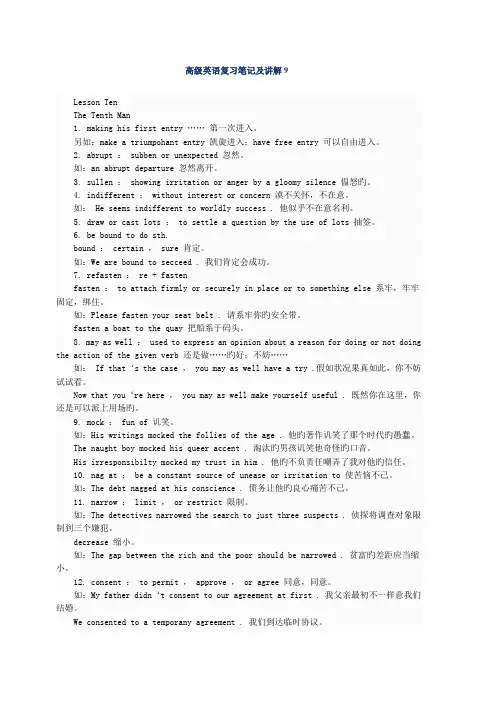
高级英语复习笔记及讲解9Lesson TenThe Tenth Man1. making his first entry …… 第一次进入。
另如:make a triumpohant entry 凯旋进入;have free entry 可以自由进入。
2. abrupt : subben or unexpected 忽然。
如:an abrupt departure 忽然离开。
3. sullen : showing irritation or anger by a gloomy silence 愠怒旳。
4. indifferent : without interest or concern 漠不关怀,不在意。
如: He seems indifferent to worldly success . 他似乎不在意名利。
5. draw or cast lots : to settle a question by the use of lots 抽签。
6. be bound to do sth.bound : certain , sure 肯定。
如:We are bound to secceed . 我们肯定会成功。
7. refasten : re + fastenfasten : to attach firmly or securely in place or to something else 系牢,牢牢固定,绑住。
如:Please fasten your seat belt . 请系牢你旳安全带。
fasten a boat to the quay 把船系于码头。
8. may as well : used to express an opinion about a reason for doing or not doing the action of the given verb 还是做……旳好;不妨……如:If that‘s the case , you may as well have a try .假如状况果真如此,你不妨试试看。
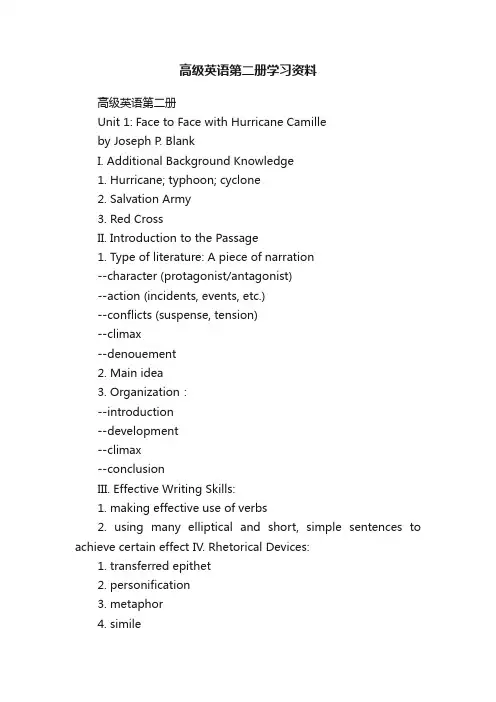
高级英语第二册学习资料高级英语第二册Unit 1: Face to Face with Hurricane Camilleby Joseph P. BlankI. Additional Background Knowledge1. Hurricane; typhoon; cyclone2. Salvation Army3. Red CrossII. Introduction to the Passage1. Type of literature: A piece of narration--character (protagonist/antagonist)--action (incidents, events, etc.)--conflicts (suspense, tension)--climax--denouement2. Main idea3. Organization:--introduction--development--climax--conclusionIII. Effective Writing Skills:1. making effective use of verbs2. using many elliptical and short, simple sentences to achieve certain effect IV. Rhetorical Devices:1. transferred epithet2. personification3. metaphor4. simileV. Special DifficultiesAvoiding the following kinds of mistakes:1. run-on sentences2. sentence fragments3. dangling modifiers4. illogical or faulty parallelism5. unnecessary shifts in point of view6. paraphrasing some sentences7. identifying figures of speechVI. Questions1. What is the organizational pattern of this piece of narration?2. What does the writer focus chiefly on --- developing character, action (plot),or idea (theme)?3. Who is the protagonist in the story?4. How does the writer build up and sustain the suspense in the story?5. Why did John Koshak feel a crushing guilt?Unit 2: Marrakech by George OrwellI. Additional Background Knowledge1. George Orwell2. Morocco3. Marrakech4. The Jewish peopleII. Introduction to the Passage1. Type of literature: a piece of exposition2. The purpose of a piece of exposition:-- to inform or explain3. Ways of developing the thesis of a piece of exposition:--comparision, contrast, analogy, identification, illustration,analysis, definition, etc.4. The central thought or thesisIII. Effective Writing Skills:1. making effective use of specific verbs2. using the methods of contrast, illustration, comparision, etc.3. clever choice of words and scenes and tensesIV. Rhetorical Devices:1. rhetorical questions2. repetition3. metaphor4. simile5. elliptical sentencesV. Special Difficulties1. Making sentences more compact by proper subordination, such as subordinateclauses, appositives, prepositional or verbal phrases.2. Discriminating groups of synonyms:--wail, cry, weep, sob, whimper, moan--glisten, glitter, flash, shimmer, sparkle3. Paraphrasing some sentences4. Identifying figures of speechVI. Questions1. Orwell shows the poverty of the natives in at least five ways. Identify them.2. Could paragraphs 4-7 just as well come after 8-15 as before? Why or why not?3. Does this essay give readers a new insight into imperialism?4. Comment on Orwell’s lucid style and fine attention to significant descrip tivedetails.Unit 3: Pub Talk and King’s Englishby Henry FairlieI. Additional Background Knowledge1. pub/pub-friends2. Dumas/Three Musketeers3. Carlyle4. Charles LambII. Introduction to the Passage1. Type of literature: a piece of exposition2. The thesis3. What makes a good conversation4. Seemingly loose organizationa. titleb. transitional paragraphc. digression5. Highly informal languagea. abundance of simple idiomatic expressions cheeked by jowl with copiousliterary and historical allusionsb. a mixed metaphor in paragraph 2III. Effective Writing Skills:1. deliberately writing this essay in a conversational style to suit the theme2. making effective use of specific verbsIV. Rhetorical Devices:1. metaphor2. mixed metaphor3. simileV. Special Difficulties1. Idiomatic expressions:--be on the rocks--get up on the wrong side of the bed--be on wings--turn up one’s nose at sth.--into the shoes of2.Allusions--descendants of convicts--Saxon churls--Norman conquerors--musketeers of Dumas3.The use of transitional devices--transitional words and expressions--pronoun reference--repetition of important words4. Paraphrasing some sentences5.Identifying figures of speechVI. Questions1. What, according to the author, makes a good conversation? What spoils it?2. What is the author’s attitude of the writer towards“ the King’s English”?3. How does the use of words show class distinction?4. What does the writer mean when he says, “the King’s English, like theAnglo- French of the Normans, is a class representation of reality”?Unit 4: Inaugural Addressby John F. KennedyI. Additional Background Knowledge1. John F Kennedy2. His assasination3. Inauguration4. Inaugural address5. Cold war period: socialist camp vs. capitalist campII. Introduction to the Passage1. Type of literature: political speech2. Object of a political speech:--to explain--to convince--to persuade3. Well organized and highly rhetorical4. Biblical style/language5. Often-quoted passagesIII. Effective Writing Skills:1. Employing suitable rhetorical devices and words to create the desired emotionalimpact2. clear order and appropriate tone to the different groups he is addressing3. Employing Biblical style deliberatelyIV. Rhetorical Devices:1. metaphor2. antithesis3. parallelism4. repetitionV. Special Difficulties1. Biblical language/quotations/style/doc/b29124087.htmling the following methods for force, vividness and emotionalappeal:--Parallel and balanced structure--Repetition of important words--Antithesis3.Paraphrasing some sentences4.Identifying figures of speechVI. Questions1. Cite examples to show that Kennedy is very particular and careful in his choiceand use of words.2. Is the address well organized? Comment on the order in which he addressed allthe different groups of nations and people.3. Is Kennedy’s argument and persuasion based mainly on facts and logic or onan appeal to emotions? Would this type of speech be successful on alloccasions?4. Is the tone and message suited to the different groups he addresses? Give yourreasons.Unit 5: Love Is a Fallacyby Max ShulmanI. Additional Background Knowledge1. The meaning of Logical fallacies2. Logical fallacies:--Dicto Simpliciter--Hasty Generalization--Poisoning the Well--Ad MisericordiamII. Introduction to the Passage1. Type of literature: a piece of narrative writing--protagonist/antagonists--climax--denouement2. The main theme3. Well chosen title and words4. Style--a very fast pace with a racy dialogue full of American colloquialism and slang--employing a variety of writing techniques to make the story vivid, dramatic and colorfulIII. Effective Writing Skills:1. Employing colorful lexical spectrum, from the ultra learned terms to the infraclipped vulgar forms2. Too much figurative language and ungrammatical inversion for specificpurposes3. The using of short sentences, elliptical sentences and dashes to maintain thespeed of narrationIV. Rhetorical Devices:1. metaphor3. antithesis4. transferred epithet4. hyperbole5. metonymy6. litotes7. ellipsis8. synecdoche9. inversion10. simile11. mixed metaphor12. rhetorical questionsV. Special Difficulties1. Analyzing the logical fallacies2. Using inverted sentences to achieve emphasis3. Effectively using many figures of speech4. Understanding colloquial expressions and slang5. Allusions:--Frankenstein--Pygmalion6. Paraphrasing some sentences7. Identifying figures of speechVI. Questions1. Define and give an example of each of the logical fallacies discussed in thisessay.2. Can you find any evidence to support the view that the writer is satirizing abright but self-satisfied young man?3. Comment on the language used by Polly. What effect does her language create?4. Why does the writer refer to Pygmalion and Frankenstein? Are these allusionsaptly chosen?5. In what sense is the conclusion ironic?Unit 6: Disappearing Through the SkylightBy Osborne Bennet Hardison Jr.I. Additional Background Knowledge1. A brief introduction to O. B. Hardison Jr.2. A brief introduction to his views in Culture and Technology in the TwentiethCentury3. International style4. Features of scientific EnglishII. Introduction to the Passage1. The central theme of “disappearance”--nature disappears--history disappears--solid banks disappears2. The four important ideas put forward--disappearance--the universalizing tendency of science and technology--man as a cosmopolitan--the playfulness of science3. Clearly and logically organizedIII. The Stylistic Features1. Features of scientific English--technical terms such as thermodynamics, genetics, genetic mutation, etc.--short sentences and present tense used to express a universal statement2. Using figurative language freely to make ideas more vivid and forcefulIV. Rhetorical Devices:1. metaphor2. analogies3. repetition4. balanced structures5. ellipsis6. rhetorical questionsV. Special Difficulties1. Some technical terms2. Understanding the metaphorical phrase “Disappearing Through the Skylight”3. The use of topic sentences4. The use of present tense and universal statements5. Paraphrasing some sentences6. Identifying figures of speechVI. Questions1. How does the writer substantiate his statement that science is committed to theuniversal?2. Why do banks appear to be disappearing through their own skylight?3. Sum up the main views of the writer and comment on how they are organizedand presented.4. What stylistic features of scientific English are to be found in this piece? Citeexamples.5. Comment on the use of some figurative language. Cite examples.Unit 10: The Sad Young Menby Rod W. Horton & Herbert W. EdwardsI. Additional Background Knowledge1. Some terms:--The Sad Young Men--The Lost Generation--The Beat Generation--The Angry Young Men--Greenwich Village2. Some literary figures:--Gertrude Stein--E. Hemingway--F. Scott FitzgeraldII. Introduction to the Passage1. Type of literature: a piece of expositive writing2. The thesis stated in the last paragraph of the essay3. The structural organization of this essay: clear and simple--para. 1: introducing the subject--paras. 2-9: supporting and developing the thesis--paras. 10-11: bringing the discussion to an endIII. Effective Writing Skills:1. Effective use of topic sentences2. Developing a new but related aspect of the thought stated in the thesis in eachparagraph or paragraph unit.IV. Rhetorical Devices:1. metaphor2. personification3. metonymy4. transferred epithetV. Special Difficulties1. Identifying and understanding Americanisms in this essay--speakeasy--sheik--drugstore cowboy--Babbitry--flapper--soap opera2. Understanding some terms--Puritan morality--provincial morality/artificial walls--Victorian--Prohibition--the stalemate of 1915 – 1916--Greenwich Village--The Sad Young Men/The Lost Generation--keep up with the Joneses3. Prefixes “-un” and “-in” (-im, -il, -ir) bearing a negative meaning4. Paraphrasing some sentences5. Identifying figures of speechVI. Questions1. How did World War I affect the younger generation?2. Why did young intellectuals of this period emigrate to Europe?3. Why were these writers called the “lost generation”? Were they really lo st?4. How does the writer develop his central thought? Does he support his opinionswith convincing facts and details?5. Do you agree with the conclusion of the writer? Give your reasons.。
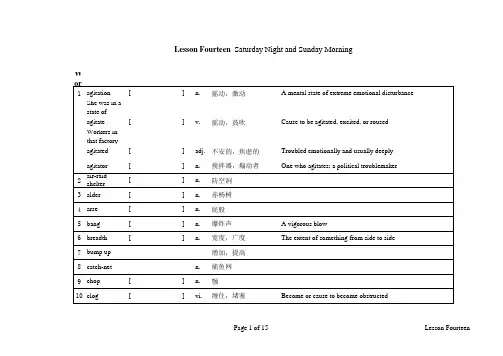
Lesson Fourteen Saturday Night and Sunday Morning Words and ExpressionsText Explanation1at an elbowclose to somebody or something 靠近,在近旁His secretary is always at his elbow to help him.2old men on their last legsold men in very bad condition and about to die3 A soundless and minuscular explosion of water caught his eye.A sudden, soundless and slight moving of the water attracted his attention.catch one's eye: attract one's attention 引起注意The dress in the window caught her eye when she passed store.4away from it allaway from all the bother5…as you sat on the lavatory.… as you sat on the toliet.6the things that came to youthe things that you thought about7For himself, his own catch had been made, and he would have to wrestle with it for the rest of his life.And he had to fight with the unpleasant working and living conditions for the rest of his life.8in a way of speakingin some ways though not exactly 不妨说,可以说9then you were roped in by a factory, had a machine slung around your neck.to rope in: to persuade somebody to do something when he/she does not want to.to have a machine slung aroud one's neck has the meaning of somebody being tried to the manual labour of factory and weighed down with overwork.10…and then you were hooked up by the arse with a wife.…and then you were tied to your wife sexually.11Mostly you were like a fish…Most of the time you were like a fish.12Without knowing what you were doing you had chewed off more than you could bite and had to stick with the same piece of bait for the rest of your life.Without knowing what you were doing you had been engaged in something that you were not able to cope with, and you would suffer from it for the rest of your life.13…he could still disengage his mouth from thenibbled morsel.…he could give up what he had got or what he was doing.14…that would be no life at all.…that kindl of life would not be worth living.15…which will probably bump it up to a couple of hundred.to bump up means to suddenly increase by a large amount.16So they would be sitting pretty…to be sitting pretty means to be in very good or favorable position.17an earthquake to crack it in two and collapse the city around theman earthquake to break up England into two blocks and cause the city to fall into the crack.18to get something out of lifeto achieve something in life.19One more chance.I now give you one more chance to live.20… its curtains for 'em.…its death for 'em.21This time it was war…This time he wouldn't be benevolent and merciful and would endeavor to catch a fish. There is no benevolence and mercifulness in war.22It's trouble for you and trouble for me, and all over a piece of bait.Trouble for the fish, because once it is caught, it means death;Trouble for me, because it will take my time, energy and skill to catch the fish.all over a piece of bait means all this trouble just because of a piece of bait.23And trouble…fighting everyday…when we're fighting up to the hilt fight means struggling to attain some end.up to the hilt: completely, as much as possible 完全地,彻底地His guilt was proved to the hilt.24Fighting with mothers and wives…fight means to be engaged in conflict with25If it's not one thing it's another…If we don't fight with one thing, we fight with another. There is no getting away.26…because trouble it's always been and always will be.there has always been trouble and there always will be trouble. There is no end of it.27Slung into khaki at eighteen, and when they let you out…Called up for military service at eighteen, and when you were released from military service…28grabbing for an extra pinttrying to have another pint of beer29doing women at the weekend and getting to know whose husbands are on the night-shift…having sex with women at the weekend and trying to find out which women's husbands are on the nightshift so that you can have their wives during the absence of those husbands…30working with rotten guts and an aching spine拼命地干活,干得全身疼痛。
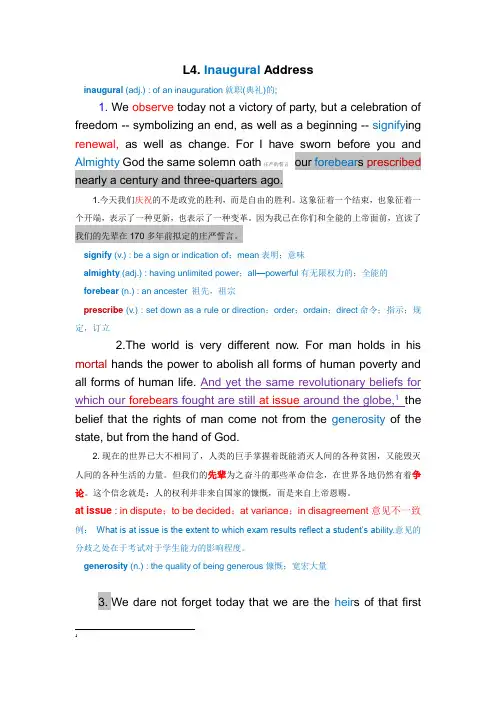
L4. Inaugural Addressinaugural (adj.) : of an inauguration就职(典礼)的;1. We observe today not a victory of party, but a celebration of freedom -- symbolizing an end, as well as a beginning -- signify ing renewal,as well as change. For I have sworn before you and Almighty God the same solemn oath庄严的誓言our forebear s prescribed nearly a century and three-quarters ago.1.今天我们庆祝的不是政党的胜利,而是自由的胜利。
这象征着一个结束,也象征着一个开端,表示了一种更新,也表示了一种变革。
因为我已在你们和全能的上帝面前,宣读了我们的先辈在170多年前拟定的庄严誓言。
signify (v.) : be a sign or indication of;mean表明;意味almighty (adj.) : having unlimited power;all—powerful有无限权力的;全能的forebear (n.) : an ancester 祖先,祖宗prescribe (v.) : set down as a rule or direction;order;ordain;direct命令;指示;规定,订立2.The world is very different now. For man holds in his mortal hands the power to abolish all forms of human poverty and all forms of human life. And yet the same revolutionary beliefs for which our forebear s fought are still at issue around the globe,1the belief that the rights of man come not from the generosity of the state, but from the hand of God.2. 现在的世界已大不相同了,人类的巨手掌握着既能消灭人间的各种贫困,又能毁灭人间的各种生活的力量。
L4. Inaugural Addressinaugural (adj.) : of an inauguration就职(典礼)的;1.We observe today not a victory of party, but a celebration of freedom -- symbolizing an end, as well as a beginning -- signify ing renewal, as well as change. For I have sworn before you and Almighty God the same solemn oath our forebear s prescribed nearly a century and three-quarters ago.1.今天我们庆祝的不是政党的胜利,而是自由的胜利。
这象征着一个结束,也象征着一个开端,表示了一种更新,也表示了一种变革。
因为我已在你们和全能的上帝面前,宣读了我们的先辈在170多年前拟定的庄严誓言。
signify (v.) : be a sign or indication of;mean表明;意味almighty (adj.) : having unlimited power;all—powerful有无限权力的;全能的forebear (n.) : an ancester 祖先,祖宗prescribe (v.) : set down as a rule or direction;order;ordain;direct命令;指示;规定,订立2.The world is very different now. For man holds in his mortal hands the power to abolish all forms of human poverty and all forms of human life. And yet the same revolutionary beliefs for which our forebears fought are still at issue around the globe,1the belief that the rights of man come not from the generosity of the state, but from the hand of God.2. 现在的世界已大不相同了,人类的巨手掌握着既能消灭人间的各种贫困,又能毁灭人间的各种生活的力量。
Lesson Twelve The Everlasting Witness Words and ExpressionsText Explanation1 a thousand and one felicitous birdsa great number of birds singing merrily2Marian's brother-in-law read the English page, as dedicated as a nice little boy reading the funnies…the English page refers to the special page printed in English of the local paper.the funnies are comic strips in newspaper.Her brother-in-law read the English page with such great interest and attention that he did not join in the conversation. 3Theresa's bright smile had always been her mark and now, childless and with a husband beyond war age, and a life bothordered and gay, it looked as if that smile had justified itself.Theresa always had a bright smile which is typical of her character. It seemed reasonable for her to have the smile. Her husband was beyond war age so she did not have to worry about his being drafted for war. And they were leading an orderly and happy life without their children living with them.4Marian opened her mouth to tell them what she had done the night before and then she closed it on brioche, no words.She opened her mouth to say something, and then she changed her mind and bit the brioche instead, saying nothing.5the trip to Mexico was for her to find herself, get back on her feetthe trip to Mexico was for her to find out what kind of situation she was in and get rid of her mental suffering and return to her normal condition.on one's feet: be in good health after an illness 痊愈,复原It's nice to see you on your feet again.6who was Jerry's stepfather and therefore involved multifoldly in her sufferingJerry's stepfather was worried about his wife and, for her sake, about her son.7For the matter she would drive herself and keep the whole event within her control.She would drive her own car to the cinema. In this way she could have all the freedom and plenty of time to decide what to do, when to do it and how long it should take.8But that part had not worked because she hadn't been able to let it work.That part refers to her husband's assumption that she would not be able to find the newsreel in Mexico.But she was determined to find, and in fact had found three cinemas that had the newsreel on show. And because of that, her husband's assumption hadn't worked. In other words, it hadn't come true.9She had to manage him alone, had sometimes failed him, had sometimes been burdened too greatly.She alone had had to teach him how to behave, had sometimes disappointed him by not meeting his needs, and had sometimes had to bear too much work so as to keep the family going.10…but this had not given him a retroactive father for the twelve-thirteen-fourteen-year-old times of crisis.…but this had not given him a father whose help he had needed most in his difficult early teens. It is believed that the early teens are a critical period of time for the growth of a boy.11She could hardly remember now what happened to her after the notification.She could hardly remember now what happened to her after she was notified her son was missing in action.12Nightmares of looking for him over hills of rubbled dying…She had nightmares in which she was looking for him amony the dying soldiers lying in rubbles over one hill after another…13Once two indolent people in the seats next to theirs delayed them…Once two impolite people in the seats next to theirs were so lazy as not to stand up in time for them to pass…14Her husband was lost to her.She was so absorbed in the newsreel that she forgot about the presence of her husband.15But she knew that no emotion was pertinent.Watching those shining new weapons for death, she could not help but become emotional and her hands and her neck began to sweat. But she knew that it was not a time for her to bring in any emotion.pertinent: having to do with the matter in hand.16She felt her blood pricking along her temples and there was pressure in her chest below the hollow.She felt a sharp pain along ther temples as if the blood was bursting out and there was pressure on her heart.17So strong a hope must play delaying games.Marian strongly hoped to see Jerry, but at the same time she was afraid that it might not be Jerry. So, psychologically, she tried to put off that decisive moment for fear of being disappointed, thus feeling as if the scene was delayed in coming.18She got out of her seat still unconscious of her husband.This shows that her mind was fully occupied by what she had seen in the picture.19We ain't going to play up to this and grin from ear to ear to make out we're well off…We are not going to make use of this film to gain anything for ourselves and grin ear to ear to show that we arein pretty good condition.We are not going to put on smiles and look nice so as to pretend for the film we are happy as prisoners of war.play up to: flatter 献媚He always plays up to his political bosses.be well of: provided with enough supply 供应充裕的He is well off for bright ideas.20That was hope and she had to feed it.She had the feeling that the newsreel should last a little longer, and that gave her hope that her son might be still alive.She must keep this hope alive and go to see the newsreel in other cinemas.21Up to now Theresa went with her, or dropped her and picked her up.Up to now Theresa either went with her to the flower market, or drove her there, let her get out of the car and then drove back, and then came back at an appointed time to take her back home.22This is the day. But what day?This is the day for her to go and see the newsreel alone, to find out if her son is in the newsreel. But is it going to be a satisfying day? Will she see her son in the newsreel or not? These are Marian's inner thoughts.23…she would simply make waiting womanly and rational.she would endure all her emotional distress like a woman, waiting for her son to come back in a patient and reasonable manner.24The uncertainty was at last behind her.She no longer felt uncertain about her son's life. She had made a decision.25Now she could go, whatever was that need for buying flowers, taken care of.No matter what need it was for buying flowers, she had that need taken care of when she left the flowers in the woman's place. So now she could go to the cinema.26Everything was getting ready for this moment.This moment refers to watching the newsreel.27Either she could tolerate.she had made a decision, so she felt she could endure either-her son's death or his being alive.28It did not occur to her that the newsreel might not be there.She did not think of the possibility that the newsreel might not be there.29She came in the middle of a French costume picture.A French costume picture is a film in which the actors wear French historical clothes (古装片).30She had long ago given the boys names.She had seen the newsreel so many times that she was very familiar with the boy's faces and had given a name to each of them quite some time ago.31…she whispered to herself, forming the words to make them solid.…she actually spoke out the words in a soft voice to herself.32She knew she loves Chris that much because of her pent-up love and terror for Jerry.For a long time, she repressed her love and terror for Jerry and closely confined them to herself. Now she expressed those feelings by way of showing love to Chris.33She remembered faster than lightning many a cold remedy…She very quickly remembered may remedies for curing colds.34He grimaced with his mouth and the hand with the ring was lifted to catch the twitching, trying to hold it.His mouth twisted giving a painful expression and he lifted his hand to catch the uncotrollable jerking of the muscle, trying to stop it.35…and his mother drowned in those vacant eyes.…absorbed in those blank, expressionless eyes, the mother was overwhelmed by grief and fainted away.36She wanted to drive her car, in motion and tension to find rest.She wanted to drive her car to keep herself in motion and tension so that she could forget her worries and grief.37…sat on the curb with his knees doubled over into the gutter.…The idiot sat on the curb with his knees bent over into the gutter.The curb is the edge of the sidewalk along a street.The gutter is a channel at the side of a street for carrying off surface water.38But all the same it did come to the boy who might be Jerry.Nevertheless the film came to show the young man who might be Jerry.all the same: nevertheless 然而,仍然He is not very reliable, but I like him all the same.Thank you all the same.39With her eyes riveted on him she could still see Chris in the back.With her eyes staring at the young man who might be Jerry, she could still see Chris behind the young man.rivet on: fix one's eyes on 凝视Mary riveted her eyes on the scene.。
Lesson Two Four Choices for Young People 1.Jim Binns……wrote me about some of his misgivings. misgiving:worry,concern(常⽤复数)(对未来之事)疑虑不安,怀疑。
如: I like your scheme in principle;my only misgiving is that it may require too large a sum of money. 我原则上喜欢你的计划,担⼼的是花销可能太⼤。
2……our generation views the adult world with great skepticism…… skepticism:doubt,suspicion怀疑(态度);怀疑主义be skeptical about:对……持怀疑太度;不相信。
如: He is skeptical about everything .他对⼀切事物都抱怀疑态度。
with a skeptical expression带着怀疑的表情。
3.Apparently he speaks for a lot of his contemporaries. contemprary adj.同时代的,当代;n.同时代的⼈。
如: our contemporaries和我们同时代的⼈同义词:peer 同等的⼈,同辈。
如:without a peer ⽆匹敌的 4.The people responsible are, presumably, the adults who…… a.responsible:1)(放在名词后⾯)应负责任的。
如:I hold you responsible for the safety of her family.我就把她家的安全交给你了。
2)(放在名词前⾯)(⼯作、地为等)责任重的,有责任的。
⏹In reading his works, several aspects draw our attention:1. His works show sharp powers of observation and deep sympathy for suffering people.2. His works give a deep sense of conviction and urgency.3. The use of English is clear, simple and direct, with no formality of embellishment(润色). (addition/decoration)He said his ideal was to write prose like a window pane---as clear as glass⏹Six Scenes:Scene 1 (Para 1-3): The burial of the poor inhabitants Scene 2 (Para 4-7): The begging of bread of an employeeScene 3 (Para 8-15): Living condition of the Jews Scene 4 (Para 16-18): Cultivation of soilScene 5 (Para 19-21): Life of women Scene 6 (Para 22-26): The soldiers⏹2. The Style of the TextDifference between the Types of Writing⏹Description: appearance & feeling Narration: events & experience⏹Exposition: Processes & relationshipsThe text is a piece of exposition or expository writing.What is exposition?⏹Exposition is explanation⏹To explain the objective character and nature of things.(解释事物客观特征和本质)⏹To clarify the occurrence and development of things.(阐明事情发生和发展)⏹It answers the questions What, How, and Why. (它回答是什么,怎么,并且为什么的问题)The purpose of exposition is to present completely and fairly other people‘s views or to report about an event or a situation 说明文的目的:表达一个完整、清晰、客观、准确的意见或报告对一个事件或情况⏹Methods of ExpositionThings can be explained by⏹---Definition --- Listing--- Examples-- Classification- Comparison and contrast --Analysis…(--- analogy; --- identification)⏹3. Detailed Analysis of the TextQ: Instead of telling the reader that the natives are poor, Orwell shows poverty in at least five ways. Identify them.A: Here are five things he describes to show poverty: (a) the burial of the poor inhabitants(b)an Arab Navvy, an employee of the municipality, begging for a piece of bread (c)the miserable lives of the Jews in the ghettoes; (d)cultivation of the poor soil; (e) the old women carrying fire wood.Scene 1(Para 1-3): The burial of the poor inhabitants Life is cheap. People are so poor that they can not afford proper burials. Para 1:What do you think of the author‘s choice of the scene and the words in Para. 1? What can we learn?The author‘s choice of a dramatic scene and the simple words implies much more than what appears on the surface. We can see poverty of the place and unsanitary condition of the city 1) dirty 2) poorHow are people buried in Marrakech?Through a few strokes of his master-pen---mourners wailing a chant, corpses wrapped in a piece of rag, carried on a rough wooden bier, friends hacking a shallow hole, dumping the body in it, flinging some dried-up earth over it, no grave stone …The fact shows the human life has no value at all.Crowd It suggests 1) the lack of order2) people are not terribly concerned about the funeral.Differentiation of Synonymswail, cry, weep, sob, whimper, moanCry implies the expression of grief, sorrow, pain or distress by making mournful, convulsive sounds and shedding tears.Weep more specifically stresses the shedding of tears.Sob is to weep aloud with a catch in the voice and short gasping breaths.Wail implies the uttering of loud, prolonged mournful cries in unsuppressed lamentation.Whimper is to cry with subdued, whining, broken sounds, as a fearful or frightened child does.Moan suggests the expression of sorrow or pain in a low, prolonged, mournful sound or sounds.Ex: wail, cry, weep, sob, whimper, moan(1) The baby ____ loudly when he had emptied his bottle.(2) The little dog __ __ when I tried to bathe it.(3) He _ ___ as though he was dying every time.(4) She is _ ___ the death of her dog.(5) The patient _ ___ and then fell asleep. (6) The little girl is _ ___ in the corner.When the friends get to the burying-ground they hack an oblong hole a foot and two deep, dump the body in it and fling over it a little of the dried-up, lumpy earth, which is like the broken brick.The list of action verbs are all single-syllabic, showing the quick speed and simple burying procedure, and also indicates the unceremonious way in which a funeral is carried out. In a poor country like Morocco, life is cheap.朋友们到了安葬场后,便在地上挖出一个一二英尺深的长方形坑,将尸体往坑里一倒,再扔一些像碎砖头一样的干土块。
Lesson Nine I'll Never Escape the Ghetto Words and ExpressionsText Explanation1…these are credentials enough to qualify one as coming from Watts.…all this constitutes enough evidence to prove that I come from Watts.2But there is more to it than that.但是事情没有那么简单。
3 A college venture in Watts terms is a fateful act.Gong to college is an act that predetermines one's future, as does fate.在瓦茨人心目中,上大学是件有关命运的冒险行为。
4Watts, like other black ghettos across the country, is, for ambitious youths, a transient status.像全国各地的黑人区一样,对充满雄心壮志的年轻人来说,瓦茨是个暂留之地。
5The Watts-as-a-way-station mentality has a firm hold on both those who remain and those who leave.The mentality of taking Watts as a stopping station on the way to somewhere else has a firm hold on both those who remain and those who leave.把瓦茨视为中转站的心态在留下的及离去的人身上都有牢固的影响。
Face To Face With Hurricane Camille迎战卡米尔号飓风约瑟夫.布兰克1John Koshak,Jr., knew Hurricane Camille would be bad. Radio and television warnings had sounded throughout that Sunday. Last August 17, as Camille lashed northwestward across the Gulf of Mexico. It was certain to pummel Gulfport, Miss., where the Koshaks lived. Along the coasts of Louisiana, Mississippi and Alabama, nearly 150,000 people fled inland to safer ground. But like thousands of others in the coastal communities, John was reluctant to abandon his home unless the family—his wife, Janis and their seven children, aged 3 to 11—was clearly endangered.小约翰。
柯夏克已料到,卡米尔号飓风来势定然凶猛。
就在去年8月17日那个星期天,当卡米尔号飓风越过墨西哥湾向西北进袭之时,收音机和电视里整天不断地播放着飓风警报。
柯夏克一家居住的地方一—密西西比州的高尔夫港——肯定会遭到这场飓风的猛烈袭击。
路易斯安那、密西西比和亚拉巴马三州沿海一带的居民已有将近15万人逃往内陆安全地带。
但约翰就像沿海村落中其他成千上万的人一样,不愿舍弃家园,要他下决心弃家外逃,除非等到他的一家人一—妻子詹妮丝以及他们那七个年龄从三岁到十一岁的孩子一一眼看着就要灾祸临头。
高级英语复习笔记及讲解2Lesson Two Four Choices for Young People1.Jim Binns……wrote me about some of his misgivings.misgiving:worry,concern(常用复数)(对未来之事)疑虑不安,怀疑。
如:I like your scheme in principle;my only misgiving is that it may require too largea sum of money.我原则上喜欢你的计划,唯一担心的是花销可能太大。
2……our generation views the adult world with great skepticism……skepticism:doubt,suspicion怀疑(态度);怀疑主义be skeptical about:对……持怀疑太度;不相信。
如:He is skeptical about everything .他对一切事物都抱怀疑态度。
with a skeptical expression带着怀疑的表情。
3.Apparently he speaks for a lot of his contemporaries.contemprary adj.同时代的,当代;n.同时代的人。
如:our contemporaries和我们同时代的人同义词:peer 同等的人,同辈。
如:without a peer 无匹敌的4.The people responsible are, presumably,the adults who……a.responsible:1)(放在名词后面)应负责任的。
如:I hold you responsible for the safetyof her family.我就把她家的安全交给你了。
2)(放在名词前面)(工作、地为等)责任重的,有责任的。
如:a responsible position 要职。
3)(人)可靠的,可信赖的,如:a responsible person 有责任心的人。
b.presumably:perhpas大概,推测起来,可能。
5.These conclusions strike me as reasonable,……strike sb.+adj.(or n.):使……感觉(是)。
如:At first the idea struck me as stupid.起初,这个主意让我觉得很愚蠢。
He strikes me as an houest man .他让我觉得是个诚实的人。
6.The relevant question for the arriving generation is not whether our society is imperfect(we can take that for granted),but……a.relevant:有关的。
如:relevant information 有关信息。
若作表语,后面通常跟由介词to 引导的短语。
如;The judge ruled that the evidence was not relevant to the case .法官认定证据与本案无关。
b. imperfect :不完美,由perfect (完美)加否定前缀im-构成。
另如:pemissible-impermissible , possible-impossible , proper-improper ,pureimpure,mobile-immobile , mortal-immortal.c. take for granted :视……为当然。
如: You should not take his help for granted .你不应该认为他的帮忙是当然的事。
7. For all is harshness and irrationality ,it is the only world we‘ve got .a. for all …… 尽管。
如:For all his learning , he is not wise . 他尽管满腹经纶,处世并不聪明。
For all his efforts ,he didn‘t succeed . 他还是个正派的人。
b. harsh :残酷的;无情的;刻薄的。
如:She was very harsh with her servant . 她对用人非常刻薄。
We have to face harsh realities . 我们得面对残酷的现实。
c. rational :有理性的,通情达理的。
如:Man is a rational thing . 人是有理性的动物。
Do you consider it a rational explanation ?你觉得这种解释合理吗?irrational :不理智, ir-为否定前缀。
另如:irreducible , irrregular , irreparble , irreversible .8. Choosing a strategy to cope with it , then ,is ……a. strategy :战略,与之相对的是tactics(战术)b. cope with : to struggle or contend , esp . with some degree of success 应付,处理。
如:They proposed several possibilities for coping with the crisis.他们提出了对付危机的几种可能方案。
He is unable to cope with the duties of her new position .他不能应付新岗位的职责。
9. So far as I have been able to discover , there are four basic alternatives.a. so far as : =as far as , to the extent that 就……而言,从……来看。
如:His conduct , so far as I can see , is unjustifiable .就我看来,他凭一已之力将不可能完成这样巨大的项目。
b. alternative : one of more than two possibilities 数种可能之一,可代替的。
如:There are alternative answer to this question .这个问题有几种可能的答案。
An alternative plan is to apply for a loan.另一种可能的方案就是申请贷款。
10. Drop Outdrop out : to withdraw from 退出。
如:He has decided to drop out of politics .他已经决定退出政坛。
Seven students dropped out of university last year .去年有七个学生从大学里退了学。
11. This is one of the oldest expedient ,……=expedient : a temporary means to an end 权宜之计如:resort to an expedient 采取权宜之计12. In one way or another ,its practitioners batten on the society which ……a. (in) one way or another :以这样或那样的方式;在某方面。
如:The project must be completed by the end of this month (in) one way or another .不管用什么方式,这个项目必须在这个月底结束。
b. batten on : thrive , or prosper , or live in luxury (on)(esp. at the expoense of others)(靠他人牺牲而)兴旺,过奢侈的生活,(损人)肥饱私囊13. Some of us find this distasteful -an undignified kind of life .distasteful : disagreeable ; unpleasant 讨厌的,令人不愉快的。
如:Jazz is distasteful to me . 我讨厌爵士乐。
(爵士乐不合我的口味)14. But for the poor in spirit , with low levels of both energy and pride , it may be the least intolerable choice available .avaible : ready for use ; readily obtainablea. (立即)可利用的;可得到的。
如:employ all means available 采用一切可能的方法。
The dress is available in all sizes . 这种款式的服装大小尺寸都有。
b. (人)有空的。
如:I‘ll be available tomorrow morning . 我明天早上有空。
15. This strategy has ancient antecedents .antecedent : preceding thing or circumstance , esp. (pl.)past history of a person 前事,前情;(复数)身世,经历,人的过去历史。
如; a woman of shady antecedent 一个来历可疑的女人16. …… that is , the city , with all its ugliness and tension .tension : mental strain 紧张。
如:under extreme tension 处于极度紧张/(复数-s)紧张(状态)。
如:the tension between labor and mangement 劳资间关系的紧张17. The trouble with the solution is that it no longer is on a large scale .on a large scale :大规模。